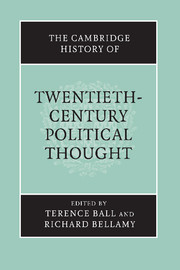Book contents
- Frontmatter
- Editors’ introduction
- Part I The changing fortunes of liberal democracy
- Part II Varieties of Marxism
- Part III Science, modernism and politics
- Part IV New social movements and the politics of difference
- 22 Pacifism and pacificism
- 23 Feminisms
- 24 Identity politics
- 25 Green political theory
- Part V Beyond Western political thought
- Biographies
- Bibliography
- Subject index
- Name index
- References
25 - Green political theory
from Part IV - New social movements and the politics of difference
Published online by Cambridge University Press: 28 March 2008
- Frontmatter
- Editors’ introduction
- Part I The changing fortunes of liberal democracy
- Part II Varieties of Marxism
- Part III Science, modernism and politics
- Part IV New social movements and the politics of difference
- 22 Pacifism and pacificism
- 23 Feminisms
- 24 Identity politics
- 25 Green political theory
- Part V Beyond Western political thought
- Biographies
- Bibliography
- Subject index
- Name index
- References
Summary
There is a widely shared albeit arguably mistaken view that ‘ecological’ or ‘green’ political thought is of relatively recent vintage, being a product of the political turbulence of the 1960s and 1970s which saw the emergence of die Grünen in Germany and green parties in Britain and France, the publication of important environmental exposés and warnings, and symbolised by the first Earth Day in 1970. But modern green thought is older still, representing a confluence of several different streams of thought and sensibility. Some have detected the first stirrings of environmental concerns as early as the sixteenth century (Thomas 1984). Others trace the first glimmerings of a green sensibility to Jean-Jacques Rousseau and the Romantic movement, with their acute appreciation of mountains, dark forests and wild nature. Others find the first stirrings of an ‘ecological’ perspective in the writings of the young Marx, with his vision of the symbiotic interdependence of man and nature (Parsons 1977). Or, more broadly, one might take note of the ecological emphases of German thinkers since the time of Goethe who, with his holistic, anti-reductionist view of nature, so greatly influenced not only German Romanticism but the biological sciences, as well as later German greens such as Rudolf Bahro and Petra Kelly. British environmental thinking was spurred by reactions to the industrial revolution, with its ‘dark satanic mills’ threatening to overtake the green countryside, and has also been greatly influenced by such Romantic nature-poets as William Wordsworth and by the naturalist Charles Darwin, amongst others whose thinking has influenced modern British greens.
- Type
- Chapter
- Information
- The Cambridge History of Twentieth-Century Political Thought , pp. 534 - 550Publisher: Cambridge University PressPrint publication year: 2003
References
- 3
- Cited by

